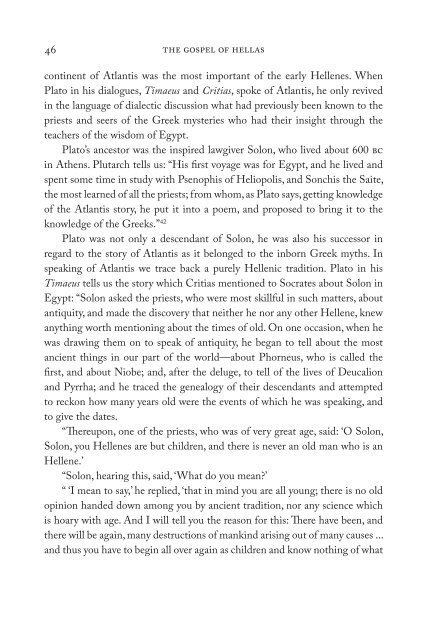The Gospel of Hellas - Research Institute for Waldorf Education
The Gospel of Hellas - Research Institute for Waldorf Education
The Gospel of Hellas - Research Institute for Waldorf Education
Create successful ePaper yourself
Turn your PDF publications into a flip-book with our unique Google optimized e-Paper software.
the gospel <strong>of</strong> hellas<br />
continent <strong>of</strong> Atlantis was the most important <strong>of</strong> the early Hellenes. When<br />
Plato in his dialogues, Timaeus and Critias, spoke <strong>of</strong> Atlantis, he only revived<br />
in the language <strong>of</strong> dialectic discussion what had previously been known to the<br />
priests and seers <strong>of</strong> the Greek mysteries who had their insight through the<br />
teachers <strong>of</strong> the wisdom <strong>of</strong> Egypt.<br />
Plato’s ancestor was the inspired lawgiver Solon, who lived about 600 bc<br />
in Athens. Plutarch tells us: “His first voyage was <strong>for</strong> Egypt, and he lived and<br />
spent some time in study with Psenophis <strong>of</strong> Heliopolis, and Sonchis the Saite,<br />
the most learned <strong>of</strong> all the priests; from whom, as Plato says, getting knowledge<br />
<strong>of</strong> the Atlantis story, he put it into a poem, and proposed to bring it to the<br />
knowledge <strong>of</strong> the Greeks.” 42<br />
Plato was not only a descendant <strong>of</strong> Solon, he was also his successor in<br />
regard to the story <strong>of</strong> Atlantis as it belonged to the inborn Greek myths. In<br />
speaking <strong>of</strong> Atlantis we trace back a purely Hellenic tradition. Plato in his<br />
Timaeus tells us the story which Critias mentioned to Socrates about Solon in<br />
Egypt: “Solon asked the priests, who were most skillful in such matters, about<br />
antiquity, and made the discovery that neither he nor any other Hellene, knew<br />
anything worth mentioning about the times <strong>of</strong> old. On one occasion, when he<br />
was drawing them on to speak <strong>of</strong> antiquity, he began to tell about the most<br />
ancient things in our part <strong>of</strong> the world—about Phorneus, who is called the<br />
first, and about Niobe; and, after the deluge, to tell <strong>of</strong> the lives <strong>of</strong> Deucalion<br />
and Pyrrha; and he traced the genealogy <strong>of</strong> their descendants and attempted<br />
to reckon how many years old were the events <strong>of</strong> which he was speaking, and<br />
to give the dates.<br />
“<strong>The</strong>reupon, one <strong>of</strong> the priests, who was <strong>of</strong> very great age, said: ‘O Solon,<br />
Solon, you Hellenes are but children, and there is never an old man who is an<br />
Hellene.’<br />
“Solon, hearing this, said, ‘What do you mean?’<br />
“ ‘I mean to say,’ he replied, ‘that in mind you are all young; there is no old<br />
opinion handed down among you by ancient tradition, nor any science which<br />
is hoary with age. And I will tell you the reason <strong>for</strong> this: <strong>The</strong>re have been, and<br />
there will be again, many destructions <strong>of</strong> mankind arising out <strong>of</strong> many causes ...<br />
and thus you have to begin all over again as children and know nothing <strong>of</strong> what

















